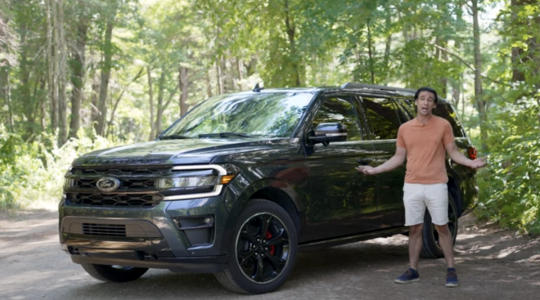Hidden danger! Find out if your car is one of the 274,000 vehicles recalled by America’s top car maker
- Replies 0
Whether you're behind the wheel of an SUV or simply share the road with them, this is a story worth your attention.
Ford, America’s largest automaker, has just issued a major recall affecting nearly 274,000 vehicles—including popular models like the Ford Expedition and Lincoln Navigator—due to a potentially dangerous brake defect.
At The GrayVine, we believe everyone deserves to feel safe on the road. Here's what you need to know about the risk, the recall, and how it could impact more than just the people driving these SUVs.
What’s Behind the Recall?
Ford has issued a recall for 223,315 Ford Expeditions and 50,474 Lincoln Navigators manufactured between 2022 and 2024.
The problem? A manufacturing issue that could cause the front brake lines to rub against the engine’s air cleaner outlet pipe.
Over time, this contact can wear down the brake line, leading to a brake fluid leak—and in the worst-case scenario, a loss of brake function while driving.
Why is this so serious?
Brakes are your car’s most critical safety system. If the brake fluid leaks out, you may notice the brake pedal feels “soft” or travels farther than usual before the brakes engage.
Eventually, you could lose braking power altogether, dramatically increasing the risk of a crash.

How Was the Problem Discovered?
The issue came to light after Ford received at least 45 reports of front brake line leaks since April 2024.
While Ford says only about 1% of the recalled vehicles are likely to have the defect, that’s still thousands of cars on the road with a potentially life-threatening problem.
The root cause traces back to a change in the assembly process at Ford’s Kentucky Truck Plant in late 2024.
Before this change, the way the radiator hose was stored during engine installation could accidentally bend the right front brake line, causing it to be routed incorrectly and rub against the air cleaner outlet pipe.
Also read: Check your VIN: 45,000+ vehicles recalled across major brands
What Are the Warning Signs?
If your vehicle is affected, you might notice:

What Should You Do If You Own an Affected Vehicle?
1. Check your mailbox: Ford will begin notifying owners by mail starting May 26. The letter will include instructions on what to do next.
2. Contact your dealer: Even if you haven’t received a letter yet, you can call your local Ford or Lincoln dealership to check if your vehicle is part of the recall. You’ll need your Vehicle Identification Number (VIN), which you can find on your registration, insurance card, or the lower corner of your windshield.
3. Free inspection and repair: Dealers will inspect the front brake line for proper clearance and routing. If needed, they’ll replace the brake line or the air cleaner outlet pipe—at no cost to you.
How Does This Recall Compare to Other Recent Ford Recalls?
This isn’t the first time Ford has had to issue a major recall for safety reasons.
Just last month, Ford recalled over 33,000 Escape and Bronco Sport SUVs due to a fuel injector defect that could cause engine fires.
In that case, cracked fuel injectors could leak gasoline onto hot engine parts, creating a fire risk. Ford is repairing those vehicles and updating their software for free as well.

Have you received a recall notice? Did you experience any brake issues with your Ford or Lincoln SUV? How was your experience with the repair process? Share your story in the comments below!
Ford, America’s largest automaker, has just issued a major recall affecting nearly 274,000 vehicles—including popular models like the Ford Expedition and Lincoln Navigator—due to a potentially dangerous brake defect.
At The GrayVine, we believe everyone deserves to feel safe on the road. Here's what you need to know about the risk, the recall, and how it could impact more than just the people driving these SUVs.
What’s Behind the Recall?
Ford has issued a recall for 223,315 Ford Expeditions and 50,474 Lincoln Navigators manufactured between 2022 and 2024.
The problem? A manufacturing issue that could cause the front brake lines to rub against the engine’s air cleaner outlet pipe.
Over time, this contact can wear down the brake line, leading to a brake fluid leak—and in the worst-case scenario, a loss of brake function while driving.
Why is this so serious?
Brakes are your car’s most critical safety system. If the brake fluid leaks out, you may notice the brake pedal feels “soft” or travels farther than usual before the brakes engage.
Eventually, you could lose braking power altogether, dramatically increasing the risk of a crash.

America’s largest carmaker, Ford, has recalled 273,789 SUVs (including 223,315 Expeditions and 50,474 Navigators made between 2022 and 2024) due to a fault that could lead to brake failure and increased crash risk. Image source: CarGurus / Youtube.
How Was the Problem Discovered?
The issue came to light after Ford received at least 45 reports of front brake line leaks since April 2024.
While Ford says only about 1% of the recalled vehicles are likely to have the defect, that’s still thousands of cars on the road with a potentially life-threatening problem.
The root cause traces back to a change in the assembly process at Ford’s Kentucky Truck Plant in late 2024.
Before this change, the way the radiator hose was stored during engine installation could accidentally bend the right front brake line, causing it to be routed incorrectly and rub against the air cleaner outlet pipe.
Also read: Check your VIN: 45,000+ vehicles recalled across major brands
What Are the Warning Signs?
If your vehicle is affected, you might notice:
- A red brake warning light on your dashboard
- A soft or spongy brake pedal that requires more pressure to stop
- Visible brake fluid leaks under the front of your SUV

The issue stems from an installation defect, where the front brake lines may come into contact with the engine air cleaner outlet pipe, potentially causing brake fluid leaks and loss of brake function. Image source: Motormouth / Youtube.
What Should You Do If You Own an Affected Vehicle?
1. Check your mailbox: Ford will begin notifying owners by mail starting May 26. The letter will include instructions on what to do next.
2. Contact your dealer: Even if you haven’t received a letter yet, you can call your local Ford or Lincoln dealership to check if your vehicle is part of the recall. You’ll need your Vehicle Identification Number (VIN), which you can find on your registration, insurance card, or the lower corner of your windshield.
3. Free inspection and repair: Dealers will inspect the front brake line for proper clearance and routing. If needed, they’ll replace the brake line or the air cleaner outlet pipe—at no cost to you.
How Does This Recall Compare to Other Recent Ford Recalls?
This isn’t the first time Ford has had to issue a major recall for safety reasons.
Just last month, Ford recalled over 33,000 Escape and Bronco Sport SUVs due to a fuel injector defect that could cause engine fires.
In that case, cracked fuel injectors could leak gasoline onto hot engine parts, creating a fire risk. Ford is repairing those vehicles and updating their software for free as well.
- Register your vehicle with the manufacturer so you’ll be notified of any future recalls.
- Check for recalls regularly at the NHTSA recall website by entering your VIN.
- Don’t ignore warning lights or unusual changes in how your car feels or sounds.
Key Takeaways
- America’s largest carmaker, Ford, has recalled 273,789 SUVs (including 223,315 Expeditions and 50,474 Navigators made between 2022 and 2024) due to a fault that could lead to brake failure and increased crash risk.
- The issue stems from an installation defect, where the front brake lines may come into contact with the engine air cleaner outlet pipe, potentially causing brake fluid leaks and loss of brake function.
- Affected owners will be notified from May 26 and can have their vehicles inspected and repaired free of charge at Ford or Lincoln dealerships, with the brake line or air cleaner outlet pipe replaced if necessary.
- This recall follows previous safety recalls by Ford, including one for some Escape and Bronco Sport models over fire risks, where cracked fuel injectors could cause engine fires; all repairs and software updates are provided at no cost to customers.
Have you received a recall notice? Did you experience any brake issues with your Ford or Lincoln SUV? How was your experience with the repair process? Share your story in the comments below!






